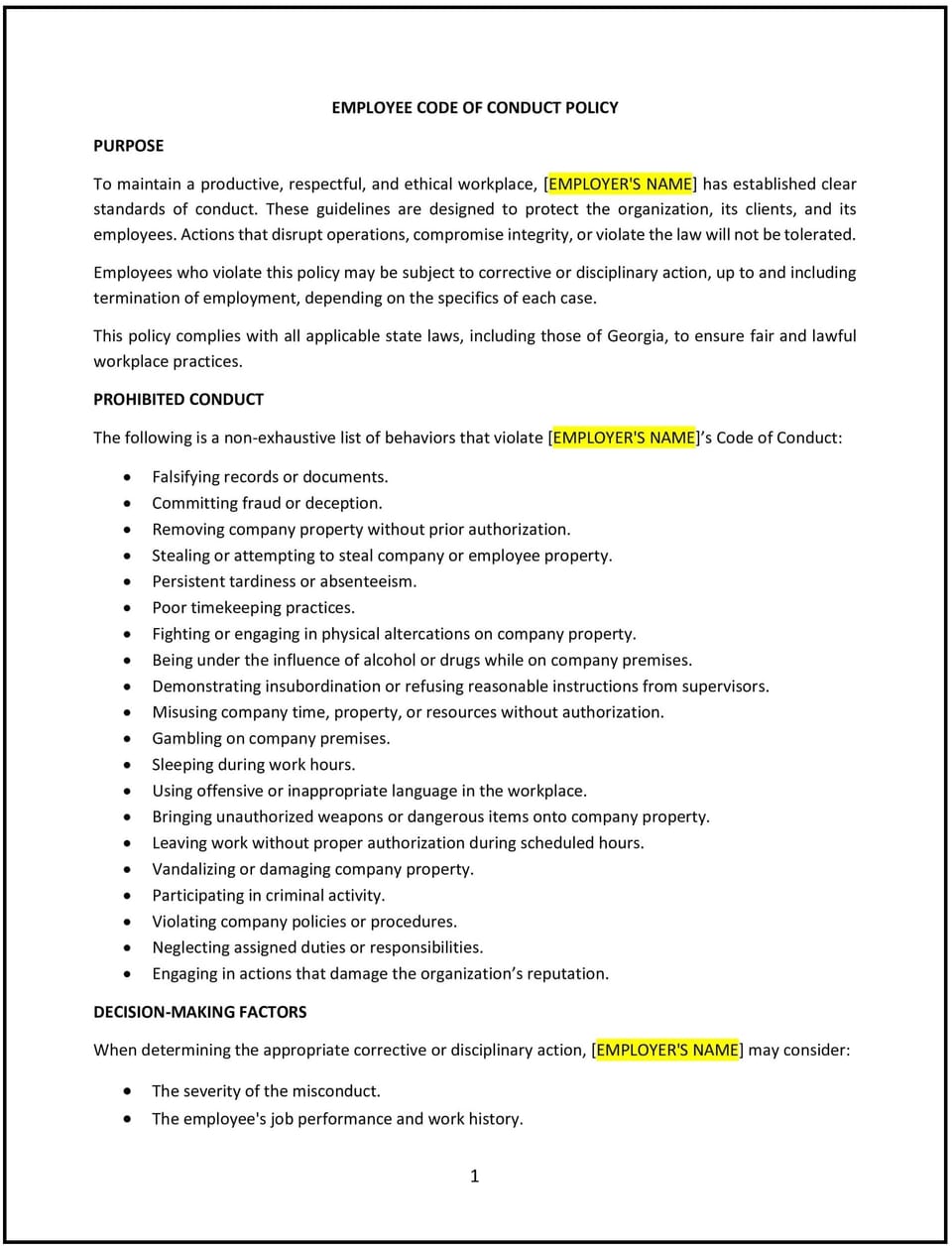Standards of conduct policy (Georgia): Free template

Standards of conduct policy (Georgia)
This standards of conduct policy is designed to help Georgia businesses establish expectations for professional behavior in the workplace. The policy outlines acceptable conduct, prohibited behaviors, and processes for addressing violations to maintain a respectful and productive work environment.
By implementing this policy, businesses can promote accountability, foster a positive culture, and minimize workplace conflicts.
How to use this standards of conduct policy (Georgia)
- Define acceptable behavior: Clearly outline expectations for professionalism, teamwork, and ethical practices in the workplace.
- Identify prohibited behaviors: Provide examples of unacceptable actions, such as harassment, discrimination, dishonesty, or substance abuse.
- Establish reporting procedures: Specify how employees should report violations, including available channels such as supervisors or HR.
- Address disciplinary actions: Outline potential consequences for misconduct, such as warnings, suspension, or termination, depending on the severity of the violation.
- Promote respect and inclusivity: Emphasize the importance of treating colleagues, customers, and stakeholders with fairness and dignity.
- Provide training: Offer regular sessions to educate employees on workplace conduct and company values.
- Review regularly: Periodically assess the policy to ensure it reflects changes in Georgia workplace practices, legal requirements, or organizational priorities.
Benefits of using this standards of conduct policy (Georgia)
Implementing this policy provides several advantages for Georgia businesses:
- Enhances workplace harmony: Clear guidelines reduce misunderstandings and conflicts among employees.
- Promotes accountability: Employees understand the expectations and consequences for their actions.
- Supports professionalism: A well-defined code of conduct fosters trust and credibility within the organization.
- Reduces legal risks: Addressing misconduct effectively minimizes potential liabilities.
- Reflects Georgia-specific practices: Tailoring the policy to local workplace norms ensures its relevance and effectiveness.
Tips for using this standards of conduct policy (Georgia)
- Communicate expectations: Share the policy with employees during onboarding and provide regular reminders.
- Lead by example: Encourage leadership to model the behaviors outlined in the policy to reinforce its importance.
- Address violations promptly: Take immediate and fair action to resolve issues and maintain workplace integrity.
- Encourage feedback: Allow employees to share concerns or suggestions to improve workplace conduct.
- Update periodically: Revise the policy to reflect changes in workplace dynamics, legal requirements, or employee feedback.
Q: What types of behaviors should businesses include in the policy?
A: Businesses should define acceptable behaviors, such as professionalism and respect, and outline prohibited actions like harassment, discrimination, or dishonesty.
Q: How can employees report violations of the policy?
A: Employees should use the reporting channels specified in the policy, such as contacting a supervisor or HR, and businesses should ensure confidentiality.
Q: What are the consequences of violating the policy?
A: Consequences may range from verbal warnings to termination, depending on the severity of the misconduct and the business’s disciplinary procedures.
Q: How should businesses promote adherence to the policy?
A: Businesses should provide training, foster open communication, and encourage leadership to model expected behaviors.
Q: How should businesses handle conflicts between employees?
A: Managers should address conflicts promptly by investigating the issue, mediating discussions, and enforcing the policy’s guidelines.
Q: Can businesses update the policy over time?
A: Yes, businesses should review the policy annually or as needed to reflect changes in workplace dynamics or legal requirements in Georgia.
Q: What role do managers play in upholding this policy?
A: Managers should model appropriate behavior, enforce the policy consistently, and address violations or concerns promptly.
This article contains general legal information and does not contain legal advice. Cobrief is not a law firm or a substitute for an attorney or law firm. The law is complex and changes often. For legal advice, please ask a lawyer.


